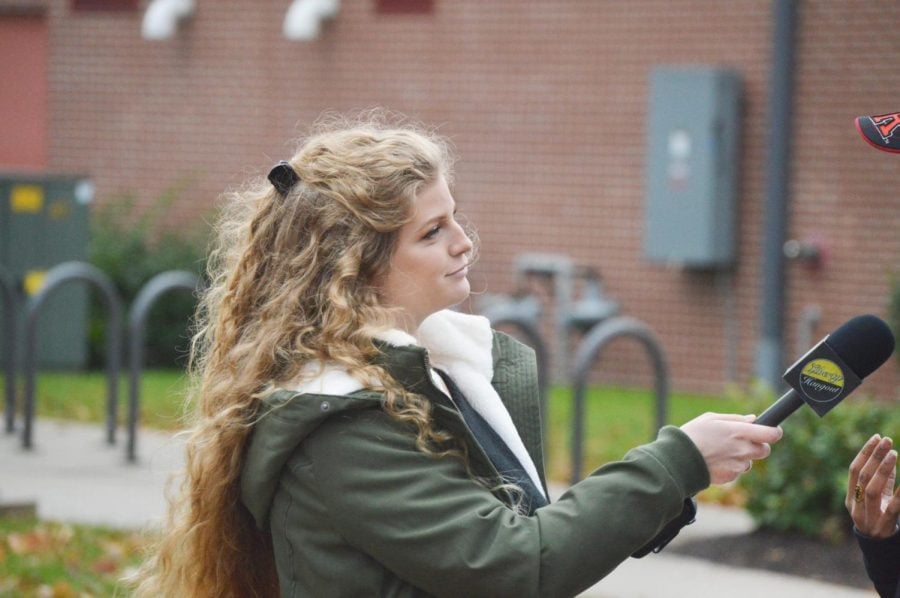Bennett and Dawson’s unethical behavior is a disgrace to journalism
3 min read
"Kaitlin Bennett interviews students at Rutgers University" (Wikipedia Commons)
By BERNADETTE D’AURIA
Staff Writer
Kent State graduate Kaitlin Bennett made her debut into the public eye by carrying an AR-10 rifle with her around Kent State University at her 2018 commencement ceremony. This event sparked controversy, as Kent State is not only known for its academic rigor but its infamous shooting in the 1970s. Bennett proclaimed that because she was now a graduate she would be able to open carry around campus, a right that she believes should have been granted to her as a student of the university. Today, Bennett is posing as a reporter who uses her entitlement to forward her own platform of beliefs rather than doing actual reporting.
Bennett resurfaced in the media after a video titled, “College Students Have No Morals,” which gained internet traction in January. Published in November 2019, the video presents Bennett as a reporter interviewing students from the University of Kentucky.
In the video, Bennett goes up to students walking around campus and asks them their opinion on trans students’ accessibility to restrooms at their school. However, rather than phrasing questions in a way that would promote a neutral attitude towards the students, Bennett demeans the students’ responses. She seems less interested in hearing what students think and more interested in promoting her own transphobic biases through the multiple interviews.
While Bennett believes she is accurately performing journalism, she is actually creating a bad name for journalists and violating the ethics of what being a journalist is.
The goal of journalism should be to report on what is going on and how people are feeling about it, regardless of the reporter’s own biases. For opinion pieces, this standard shifts, as that is a place for someone expressing their own point of view on a topic, event or person. But when a reporter is doing a man-off-the-street interview where they pull opinions from random individuals, they should not be promoting their own biases to make the interviewee look bad.
Bennett does not only violate the standards of journalism, but she promotes views that are so extreme that some people have started to question whether or not she, herself, is a social experiment. In many of the discussions about Bennett on Twitter, people who have watched her interviews and have seen her InfoWars reporting have begun to doubt whether or not she is stating outlandish opinions because she believes them or if she is saying them for shock factor.
Promoting bigoted mindsets and ignorance as a means for public views is a dangerous path. Not only does it corrupt the trustworthiness of journalists and those that consume their work, but it also promotes the idea that ignorance is no longer an issue in our society. People remain close-minded and to ignore that in favor of believing that someone is promoting a certain ideology for views fosters a sense of ignorance that will allow these mindsets to continue on.
Bennett is not the first journalist to focus more on their opinion than on the opinions of those being interviewed. Self-proclaimed documentarian, Shane Dawson, has also promoted this faux idea of reporting. Dawson made a name for himself in the earliest stages of YouTube and recently has geared his channel towards docu-series’ which focus on controversial figures in the media, most prominently in the YouTube forefront.
Similar to Bennett, Dawson has clunky interviews that are not geared towards finding out information and what people think. His interviews are mostly just conversations with no prior structure and leave anticlimactic results once put together in what he labels as a “documentary.” If Dawson was truly motivated to be an investigative journalist, he would realize that in order to make a successful documentary, he would have to do more thorough and thought out research, not just focus on how he responds to the information he has received.
While Dawson may not promote the same close-minded message that Bennett does, both of their styles of reporting violate the ethics of journalism and jeopardize journalistic integrity. Their stories and interviews focus more on how they respond to it and lack a cohesive, trustworthy format regardless of political views.











